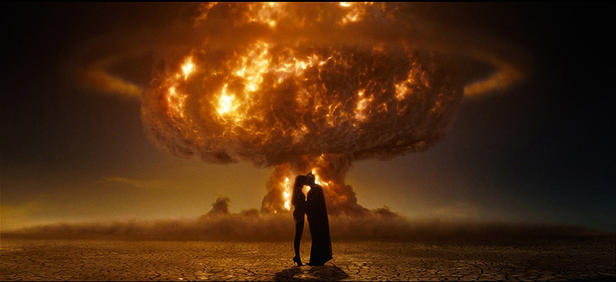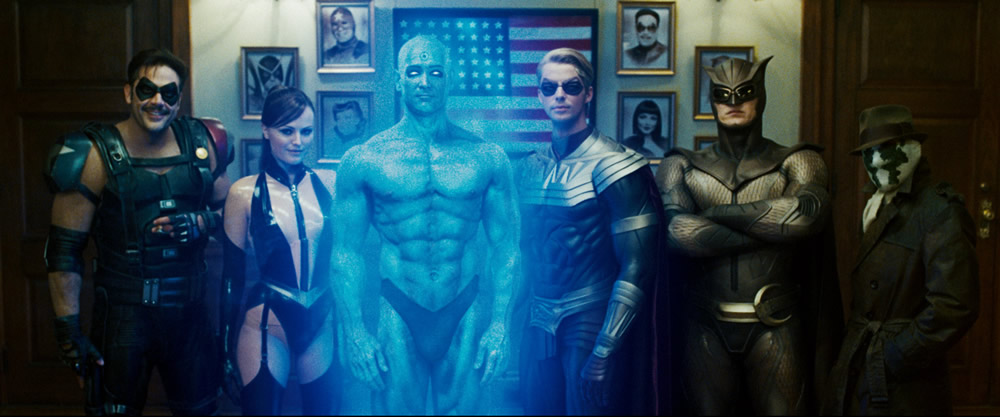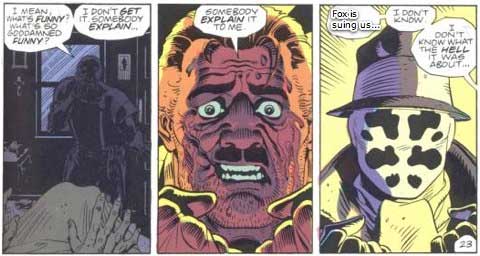
“Come writers and critics who prophesize with your pen, and keep your eyes wide — the chance won’t come again.” As in the original comic, two Dylan songs bookend Zack Snyder’s ambitious, admirable, and flawed adaptation of Alan Moore and Dave Gibbons’ Watchmen, the critically-acclaimed tale of the rise and fall of Cold War superheroes (which I’ve now seen twice.) The first, “The Times They Are A-Changin’,” comes direct from Dylan himself, and scores the impressive, easter egg-filled opening credit montage that is one of the highlights of the film. Here, Snyder has taken the world of Watchmen, fused it with some quality Bob, and made something transporting and uniquely filmic. (Fanboys and fangirls, note the original Nite Owl saving the Waynes. By the way, Dylan, US History, and superheroes — yes, this sequence is easy for me to love.)
On the other hand, over the end credits, we get a a truly terrible version of “Desolation Row” by My Chemical Romance, whom I’m not particularly familar with but who, on the basis of this cover, would seem to be derivative, talentless hacks. Now, I’m not averse to Dylan played fast and loud. To hear it done right, check out Rage Against the Machine excavating the angry heart of “Maggie’s Farm”, or the White Stripes’ live takes on “Isis” or “Lovesick”, or, of course, Jimi’s “All Along the Watchtower” (also in the movie, right where it is in the book.) But MCR have completely missed both the power and the poetry of “Desolation Row,” and just play it fast, sloppy, and nu-punk like the faux-Green Day cover band (which makes them faux-faux-Pistols) they seem to be.
If I’ve spent a lot of time here talking about these two Dylan songs at the onset instead of Watchmen, it’s because they mirror the dichotomy present in the film. In certain sequences like the opening credits, Snyder manages to catch lightning in a bottle and really bring elements of the graphic novel to life, albeit in truncated form. There are moments in the movie, usually involving Rorschach or Dr. Manhattan, where I was struck by the sheer sensation of seeing the book leap off the page. (Short plot summary for the uninitiated: In an alternate-America 1985, on the eve of what appears to be nuclear Armageddon, one of a dwindling band of ex-superheroes is murdered in (and then out of) his New York City apartment. Rorschach, a borderline-psychotic right-wing vigilante who dresses like Philip Marlowe and rasps like Christian Bale, wants to know why. It’s a dangerous question.) The altered ending notwithstanding, it’s somewhat amazing to me that we got a Watchmen movie this close to the source material, and, by all accounts, Snyder had to fight tooth and nail with the studio suits for every cynical, resolutely uncommercial facet of it.
But, at other times, Snyder’s bad habits sadly leak through and undeniably taint the end product, most notably in the gratuitous violence present here. In interviews, Snyder can sometimes come off as a geekier version of the white fratboys in Harold and Kumar. (“Dude, that’s so extreme!“) And that better-harder-faster mentality results in some serious whiffs along the way in Watchmen, when Snyder ratchets up the gore and bone-breaking at the expense of the story. However close the movie gets to gorgeously capturing Manhattan’s reveries on Mars (although I wish the Doc’s living in an endless now was better emphasized.), it basically drops the ball completely on Rorschach’s “origin” (which I quoted in my pre-movie post), mainly because Snyder sidesteps the existential horror of Kovacs’ story to amp up the violence of it. In the comic, Kovacs has pierced the veil of the sheltering sky and discovered all is blackness. In the movie, he just seems to be on a torture-porn killing spree. Same goes for a scene involving Dan (Nite-Owl) and Laurie (Silk Spectre) getting jumped by the Top Knots gang in a dark alley. It’s bone-crushingly brutal when it doesn’t need to be, actually has these two kiling people Rorschach-style, and seriously detracts from the more interesting scene it’s intercut with, that of Dr. Manhattan inadvertently exposing his disinterest in humanity in an interview with Ted Koppel.
Now, as with loud, angry Dylan covers, I’m not averse to gore or over-the-top violence when it serves the narrative. To take an example, there’s a scene involving human entrails stuck to the ceiling (don’t you want to see this now?) which is also overly Snyderish, but I think works in context. (The voiceover is making Hollis Mason’s point that, with the arrival of Dr. Manhattan (i.e. the advent of atomic weaponry), the superhero game has forever changed — it’s no longer gallantly nabbing bankrobbers and pursesnatchers with a few “Wham! Pow!” four-color blows, but something much darker and more lethal.) But Snyder’s Watchmen is unnecessarily violent at the wrong times (see also Big Figure’s henchmen), and then inexplicably goes soft at the moments when gore is virtually required. I’m referring here to the consequences of the Big Plan, which feel strangely weightless in the movie, partly because (in this cut) no characters we’ve been following are anywhere close to Ground Zero and partly because, unlike every other action sequence in the movie, it’s all very PG-13 all of a sudden. (Contrast this with the opening of Chapter 12 in the comic, which is basically several pages of horrific imagery, unlike anything we’ve yet seen in the story.) Now, I’m willing to bet dollars-to-donuts that 9/11-squeamish studio types were unyielding about the soft-pedaling of the climax here (which, by the way, is elegant in its own way even without the squid.) Still, it’s hard to escape the feeling that, while Moore and Gibbons used violence in their tale to comment on its awfulness (and the awfulness of The Plan), Snyder often just uses it because it’s like, totally extreme.
Don’t get me wrong: I have no idea how it plays to people unfamiliar with the comic, but for the rest of us, there’s a lot to like here. Even notwithstanding some godawful, cringe-inducing age and Nixon make-up (I guess everyone was busy on Benjamin Button) and one of the worst movie sex scenes in recent memory (I’m offended on behalf of Leonard Cohen), Watchmen is a better film than some of the critical pans make it out to be. Jackie Earle Haley’s Rorschach is especially dead-on, and is rightfully drawing most of the acting kudos right now — This should be a career-defining role for him. But Billy Crudup’s Dr. Manhattan and, surprisingly, Patrick Wilson’s Nite-Owl are also pretty close to note-perfect. (So too is Matt Frewer’s Moloch, who absolutely nails his big moment — “You know that kind of cancer that you get better from eventually? Well, that ain’t the kind of cancer I got.”) And Jeffrey Dean Morgan’s Comedian and Matthew Goode’s Ozymandias grow on you, even if Ozy seems a bit charisma-starved compared to his comic counterpart. (As for Malin Ackerman’s Silk Spectre…uh, well, let’s just say she’s in it too.)
So, in short, I liked the movie, would recommend it to readers and non-readers alike, and thought even more of it the second time around when I was less burdened by expectations. (Yes, it’s wayyyy better than 300, and I’m looking forward to the 30-minute longer cut, which is rumored to spend more time with Rorschach’s shrink and the two Bernards.) Still, it’s hard to shake the nagging sense that the things I really liked about Watchmen would’ve made it into any reasonably faithful movie version, and that a different director than Snyder might’ve brought about a better, richer film in the end.
Still, as my old boss was wont to say: We don’t need people who get the ball to the twenty-yard line; we need people who can bring it over the goal line. And, for better or worse, Snyder got this ball over the goal line where Terry Gilliam, Darren Aronofsky, and Paul Greengrass couldn’t. Let’s give credit where it’s due: After twenty years of trying, they actually made a Watchmen movie, and it ended up being surprisingly close to the source material and not at all an embarrassment or cash grab. I presume the Rorschach types probably loathe this end result, compromised as it is in certain places. But for the rest of us, I’d say this new Utopia, however flawed at times, is close enough for government work.


